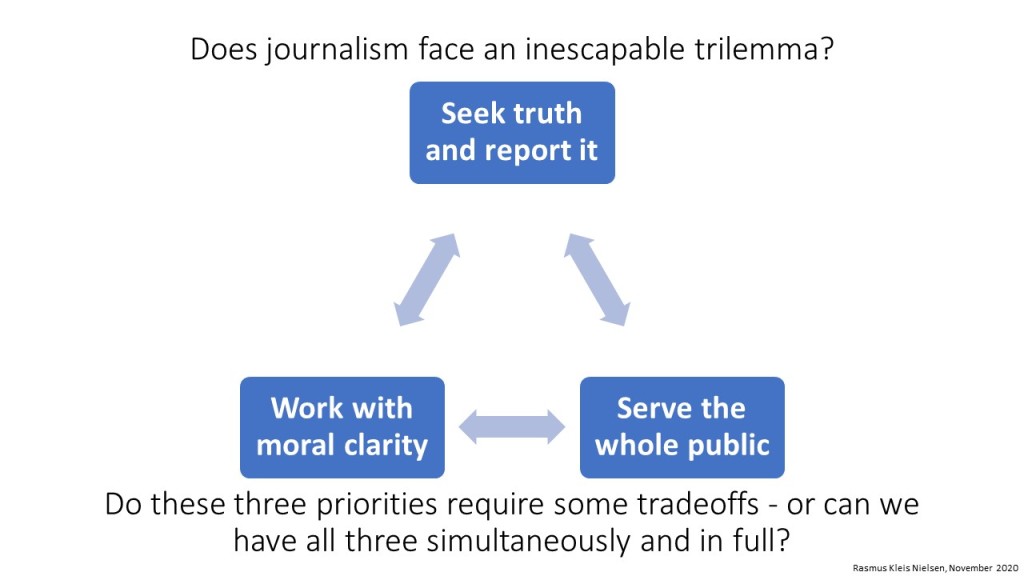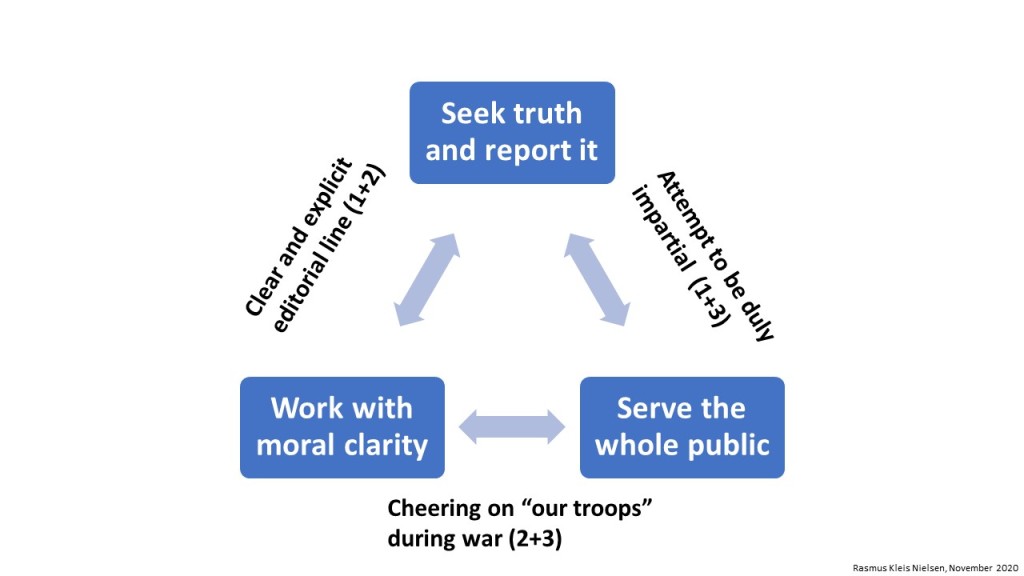Here are three values I think most journalists would like to base their work on.
1) Seek truth and report it
2) Work with moral clarity
3) Serve the whole public
I wonder whether journalism faces inescapable trilemma that may require tradeoffs between these different aspirations?
Is there a “journalists’ trilemma”, akin to the political trilemma for the world economy Dani Rodrik identified many years ago where we might want different things at the same time, but where they are sometimes mutually incompatible so we can never have all of them simultaneously and in full?
If so the journalists’ trilemma might look something like the below – and necessitate hard decisions about which of different values to prioritize, knowing that there are likely to be tradeoffs involved.

Recognizing there are irreducibly plural values does not entail relativism, simply recognizing sometimes we have to make choices between different things that are valuable in different and sometimes incommensurable ways and that we can’t always have everything. (Recognize this from your own life? I do.)
This is not an easy idea to accept.
It is attractive – even seductive – to imagine that different good things we might want can all be accomplished at the same time.
But can they?
Looking at the US right now, I find it hard to imagine how journalists can cover Trump with moral clarity while also reaching whole public (just as I think the ambition to cover the news while serving the whole public, often implicitly in practice assumed to be made up of white men, has in the past sometimes come at the expense of moral clarity).
Let me give just three examples.
First, below is how the New York Times editorial board described the Republican Party Oct 24.
“a hollowed-out shell devoid of ideas, values or integrity, committed solely to preserving its own power even at the expense of democratic norms, institutions and ideals.”
If that is so (and the Democratic Party is fundamentally different), surely prioritizing seeking truth and reporting and working with moral clarity would require the newsroom to recognize this, even at the risk of alienating one major party and half the American electorate? Otherwise he-said-she-said journalism risks lapsing into false equivalence?
Second, a post-election Tom Nichols piece in the Atlantic describing Trump as a “sociopath” and the roughly seventy million Americans who voted for him in 2020 as follows:
“[they] are showing that they are just like him: angry, spoiled, racially resentful, aggrieved, and willing to die rather than ever admit that they were wrong.”
If that is so (and those who voted for Biden are not like this), surely truth seeking and moral clarity would require putting the role of racism and racial resentment front and center of all reporting trying to account for the election result – even if that might further alienate right-wing Americans from the news media? (I don’t think people appreciate being called angry, spoiled racists – even if some of them are angry, spoiled racists.)
Third, Wesley Lowery powerfully called for moral clarity in journalism this summer, and effectively suggested that notions of objectivity stood in the way of the truth, arguing that
“Moral clarity would insist that politicians who traffic in racist stereotypes and tropes — however cleverly — be labeled such with clear language and unburied evidence.”
I think he has a strong case, and greater moral clarity on racism, sexism, and other forms of structural inequality could arguably help journalism serve many historically underserved audiences better – but at the same time I think also turn off many whites who voted for racist politicians, and may find labelling these politicians as such in news coverage partisan and off-putting.
To be clear, I personally agree the Republican Party has much to answer for, that racism (and sexism) is central to US society, and that many politicians actively traffic in racist stereotypes. And I find the case for focusing on commitment to truth and moral clarity very compelling. The hurt feelings of white Americans at being called racist is not more important than seeing the world for what it is.
But in irreducible diverse, disputatious societies where we are very different and often vigorously disagree about important issues I don’t think we agree on what moral clarity look like, and many forms of moral clarity I might personally find compelling, and that may potentially help engage more people of color and more women with the news, at the same time risk further alienating many conservative Americans from the news media. (It is already the case that just 13% of those in the US who identify as being politically on the right say they trust most news most of the time in our Digital News Report survey. Imagine their reaction if they and the politicians they vote for are routinely described as racists in day to day news coverage. Maybe that is a price worth paying. It would be a price nonetheless, and if paid, should be paid knowingly and willingly.)
If navigating this requires hard tradeoffs, then there is an inescapable trilemma, where we can have maybe two of the three values outlined above, but not all three of them, at least not simultaneously and in full.
And if so, then it is for each journalist and news organization to reflect on what they think right tradeoffs are. No one makes these choices for “journalism”. They are made by the individuals and organizations that make up journalism.
In line with Candis Callison and Mary Lynn Young, I personally think these individuals and organizations have historically prioritized a vision of the whole public that in practice privileged white men, often affluent and well educated white men like myself, and offered little moral clarity on racism, sexism, class, and other forms of structural inequality, and that a reckoning with that is long overdue. (As I wrote about here.)
But that does not make the trilemma go away. Sometimes we cannot have it all and each of us will have to choose.
Looking at the three values I outlined at the top, I think all choices that deserve to carry the name journalism remain committed to the first one, seeking truth and reporting it. (The defining value of journalism in my view is to provide people with relatively accurate, accessible, diverse, relevant, and timely independently produced information about public affairs, something no other profession or institution tries to provide.)
But what else can one do at the same time? What combinations may the trilemma allow for? There are three, I think.
Clear and explicit editorial line: Some news organizations try to combine truth seeking that with different kinds of moral clarity (the Guardian offers one kind, the Daily Mail a very different kind). So seek truth, and offer moral clarity, but often divisive, definitely not for the whole public. 1 and 2, less 3.
Attempt to be duly impartial: Other news media try to report the news while serving everybody (BBC, Reuters) even if that may sometimes preclude the kind of moral clarity that many may want to see in how the news is covered, also – especially? – on the issues that divide us, like racism. So seek truth, and try to serve whole public, but can come across as deliberately obtuse on the divisive moral issues of our time. 1 and 3, less 2.
Jingoistic “journalism”: As said, I think news media who give up on the first value, seeking truth and reporting it, lose all claims on what the term journalism means to me, but we do see it in in the more jingoistic end of war coverage of “our troops” (“my country, right or wrong”, etc.). So, moral clarity for the whole public, but sometimes at the expense of seeking truth and reporting it. 2 and 3, but not much of 1.
Then perhaps we can map these three types on to my ugly sketch.

There is more to journalism than these three values, and news media, in addition to ideals, have interests (e.g. commercial sustainability) that complicate matters further.
But even without all that journalism aspires to be beyond these three values, and even without all those further complications, this trilemma seems irreducible to me, not so much as puzzle to solve as a set of choices to make?
I have tremendous respect for how hard these choices are to make, recognize how they can offer different kinds of valuable journalism, and find it entirely understandable that journalists often disagree on how to make them. But they may have to.
